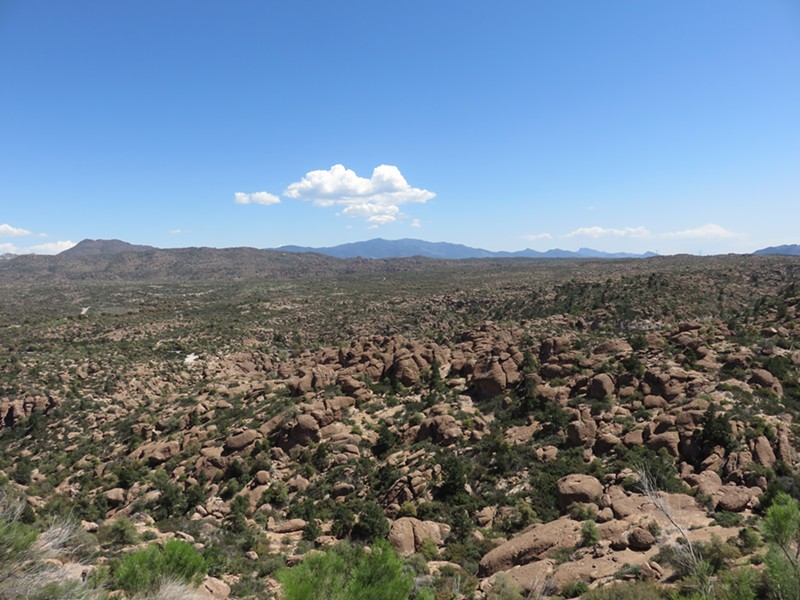The Biden administration recently argued in federal court that a controversial land trade in the Oak Flat region for a copper mine shouldn't be stopped by a lawsuit — despite previously moving to pause the project.
In an 83-page brief filed in the U.S. Ninth Circuit Court of Appeals on May 17, attorneys with the U.S. Department of Justice asserted that a lower federal court was right to deny an injunction sought by Apache Stronghold, a group that is currently suing the federal government to stop the copper mine project. They argued that Apache Stronghold's claims that the land transfer violates historic tribal treaties and religious freedoms fall flat.
"Plaintiffs cannot establish that they will suffer irreparable harm absent preliminary relief," the brief states. "The district court's order denying preliminary injunctive relief should be affirmed."
For years, two Australian mining companies, Rio Tinto and BHP, have sought to build a massive copper mine in Oak Flat, a region of the Tonto National Forest east of Phoenix that is considered sacred by the San Carlos Apache Tribe and other regional Native American tribes. The proposal, which was approved by Congress in 2014, involves swapping 2,422 acres of federally protected forest land in that area for over 5,000 acres of private land and constructing a roughly mile-wide crater to extract copper deposits located underneath Oak Flat. Critics of the project argue that it will be an environmental disaster and decimate indigenous sacred sites.
After the Trump administration approved the land swap in early January, Apache Stronghold promptly sued to stop the federal government from issuing a final environmental impact statement and executing the transfer. In their original complaint, Apache Stronghold argued that the land transfer violated their religious freedom and the Treaty of Santa Fe that was signed by the Western Apaches and the federal government in 1852. After a federal judge ruled that the deal could go through and denied the request for an injunction, Apache Stronghold appealed, kicking the case up to the Ninth Circuit.
The news of the federal government's position on the land swap comes after the Biden administration made headlines back in March for withdrawing the final environmental impact statement for the project and temporarily halting the deal. The federal government said then that it wanted more time to "fully understand concerns raised by Tribes and the public" about the project.
For critics of the Oak Flat copper mine project, the latest arguments made by the Biden administration's attorneys amount to a slap in the face.
"We thought that when Biden was coming in that he would also see this as really hurtful," said Robin Silver, co-founder of the Center for Biological Diversity. "This is basically still Trump-speak."
Proponents of the lawsuit aren't the only ones claiming that the Oak Flat copper mine will have a severe impact on regional indigenous peoples. In his February 12 order denying Apache Stronghold's request for an injunction, U.S. District Court Judge Steven P. Logan strongly endorsed the notion that the project will have ramifications for Apache religious practices.
"Quite literally, in the eyes of many Western Apache people, Resolution Copper’s planned mining activity on the land will close off a portal to the Creator forever and will completely devastate the Western Apaches’ spiritual lifeblood," he wrote. "The Court does not dispute, nor can it, that the Government’s mining plans on Oak Creek will have a devastating effect on the Apache people’s religious practices."
But despite Judge Logan's acknowledgement of Native Americans' connection to Oak Flat, the legal distinctions that he and the Department of Justice have articulated in court don't hold water for critics of the mine project.
"We disagree that destruction of our sacred land and stopping our ability to practice our religion are not a 'substantial burden,'" Apache Stronghold leader and former San Carlos Apache Tribal Chairman Wendsler Nosie, Sr., said in a statement, referring to the Ninth Circuit brief. "And we disagree that giving away Chi'chil Bildagoteel to a private company, thus subjecting us to criminal trespass arrest for praying on our sacred grounds, is not coercion."
In the brief, the Biden administration argued that there is no immediate threat from the project since the federal government temporarily suspended the land swap and the public will allegedly still have "broad access" to Oak Flat until the copper mine operation "precludes public access for safety reasons." They also argued that Apache Stronghold has been unable to prove that the project "targeted their religious conduct" and that while the group represents some Apache tribal members, they can't bring allegations regarding past tribal treaties since they aren't a federally recognized tribe.
"Only Congress can provide the relief Plaintiffs seek," the brief states. "Congress determined that expanding Tonto National Forest ... as well as facilitating copper mining in Arizona, employing more than 3,000 people, and providing billions in tax revenue and economic growth, is in the public interest."
"Certainly, it’s disappointing. But even more it’s disturbing," Michael Nixon, an attorney representing Apache Stronghold, said in reference to the brief. "Because they have a choice and they should respect the United Nations Declaration on the Rights of Indigenous People as well as the treaty of Santa Fe and honor that."
"They’re saying that the Apache Stronghold doesn't have standing, that they don't even have the legal rights to complain about this, which is absurd," he added. "They have every right to complain about what the government is doing."
The U.S. Department of Justice did not respond to Phoenix New Times' request for comment.
[
{
"name": "Air - MediumRectangle - Inline Content - Mobile Display Size",
"component": "18478561",
"insertPoint": "2",
"requiredCountToDisplay": "2",
"watchElement": ".fdn-content-body",
"astAdList": [
{
"adType": "rectangle",
"displayTargets": "mobile"
}
]
},{
"name": "Editor Picks",
"component": "16759093",
"insertPoint": "4",
"requiredCountToDisplay": "1",
"watchElement": ".fdn-content-body",
"astAdList": [
{
"adType": "rectangle",
"displayTargets": "desktop|tablet"
},{
"adType": "rectangle",
"displayTargets": "desktop|tablet|mobile"
}
]
},{
"name": "Inline Links",
"component": "17980324",
"insertPoint": "8th",
"startingPoint": 8,
"requiredCountToDisplay": "7",
"maxInsertions": 25
},{
"name": "Air - MediumRectangle - Combo - Inline Content",
"component": "16759092",
"insertPoint": "8th",
"startingPoint": 8,
"requiredCountToDisplay": "7",
"maxInsertions": 25,
"watchElement": ".fdn-content-body",
"astAdList": [
{
"adType": "rectangle",
"displayTargets": "desktop|tablet"
},{
"adType": "rectangle",
"displayTargets": "desktop|tablet|mobile"
}
]
},{
"name": "Inline Links",
"component": "17980324",
"insertPoint": "8th",
"startingPoint": 12,
"requiredCountToDisplay": "11",
"maxInsertions": 24
},{
"name": "Air - Leaderboard Tower - Combo - Inline Content",
"component": "16759094",
"insertPoint": "8th",
"startingPoint": 12,
"requiredCountToDisplay": "11",
"maxInsertions": 24,
"watchElement": ".fdn-content-body",
"astAdList": [
{
"adType": "leaderboardInlineContent",
"displayTargets": "desktop|tablet"
},{
"adType": "tower",
"displayTargets": "mobile"
}
]
}
]










